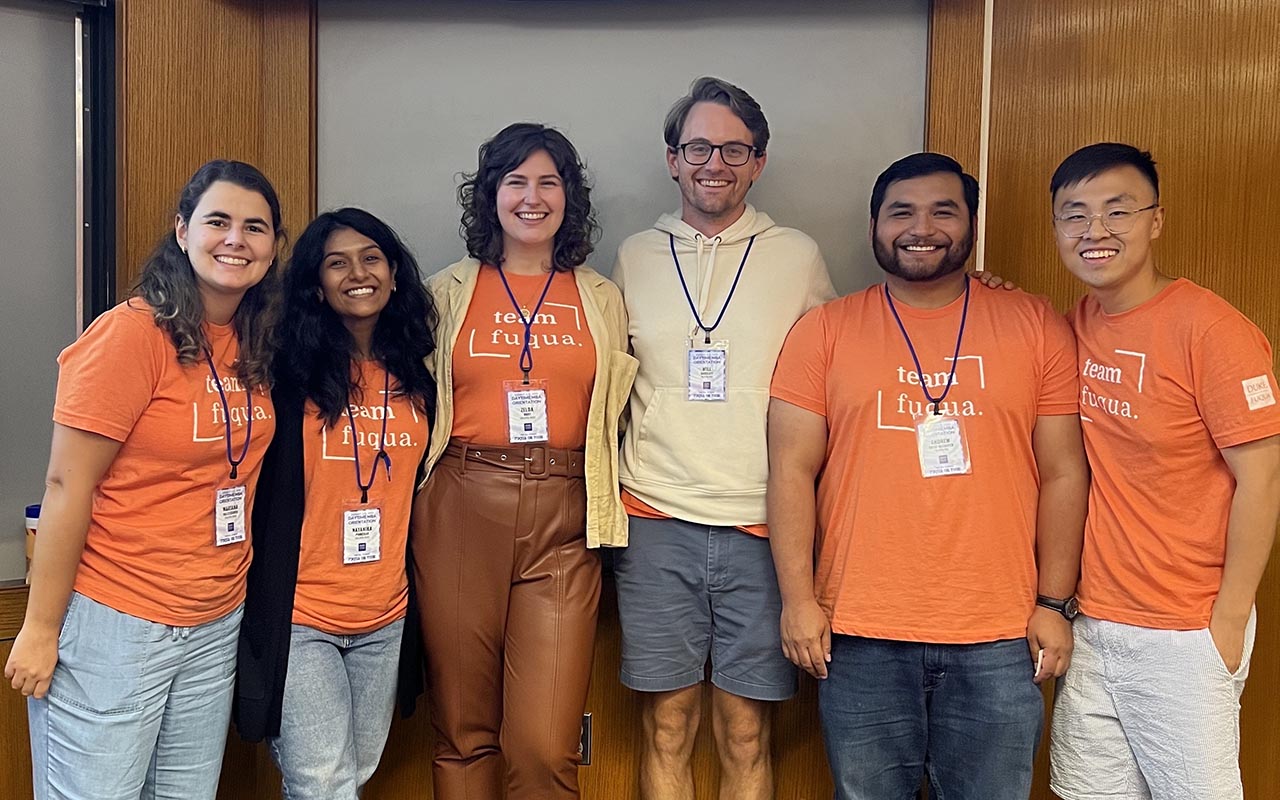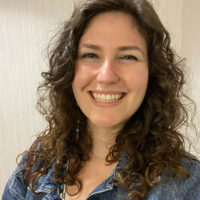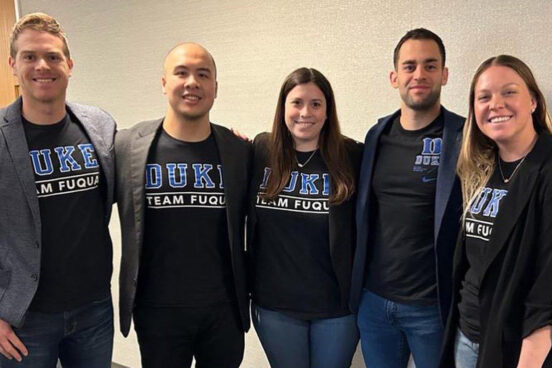Duke Daytime MBA Student Blog

Managing Quantitative Classes Without a Quant Background
For anyone who is considering a business degree and feels concerned about their “nontraditional” path, I’d urge you to change your thinking.

When I think about the poets and quants at business school, I lean heavily poet. After studying sociology in undergrad (and successfully petitioning out of my one required statistics class), I spent my pre-Fuqua work years in fundraising and communications for grassroots nonprofits. I am incredibly proud of my work experience and the impact it made on people’s lives, but it is not the typical path to an MBA.
Like many “nontraditional” students, I battled imposter syndrome coming into business school. I turned over the idea of going back to school for my MBA in my mind for a long time before deciding to go for it because I felt intimidated by not being a “math person” and worried I wasn’t “business-y” enough.
Now that I’m here and have acclimated to the MBA life, I’ve realized Fuqua benefits from a diversity of perspectives, and my background is actually a strength, not a deficit—even in those dreaded quantitative core classes. I feel very passionate about letting other social impact and “nontraditional” students know that they have a place here, so I want to share my experience with my quantitative core and the key lessons I’ve learned along the way.
Leaning on My Team
One of the greatest strengths of the Fuqua approach, in my opinion, are C-LEAD, short for “consequential leadership,” teams. We’re matched with other students during orientation and stay together through the entirety of the core curriculum. This is the group we complete all projects with, and we serve as a core support system.

I lucked out with an amazing C-LEAD, and when it comes to the quantitative core, my teammates have been my lifeline. We fill each other’s gaps and help each other stay on top of things with weekly check-ins. And because of the diversity of the core, I was able to occupy more of a learner role for the quantitative classes and take more of a leadership role for qualitative classes and projects. Outside of the C-LEAD system, Fuqua has lots of resources for students in the core, including sessions with teaching assistants and second-year student tutors, but I always found my best learning came from working with my C-LEAD.
Finding the Relevance
As a social impact student, I knew going in that not everything necessarily would apply to my interests— but a lot did, and even more than I expected. My favorite core class was definitely Financial Accounting because it was so tangible and practical. I could immediately relate some of the concepts to what I had seen preparing for annual audits in my nonprofit development experience. Plus, I found it fascinating to learn how we can be better users of financial statements to evaluate the stories a company was telling in its reporting. I deeply appreciated the class’s focus on corporate transparency and accountability.
In classes like Financial Management, I knew I would need the foundational knowledge later in electives I am more interested in, like Impact Investing. Being able to translate what I’m learning and finding the relevance for my interests have been crucial skills for staying motivated through the hardest weeks of business school.
Developing Routines That Work for Me
It wasn’t just the topics on the syllabus that I needed acquaint myself with; I also needed to re-learn how to learn and find the approach that works for me. What made the difference was building some sustainable routines that allowed me to get my work done and focus on what’s most important to me.

My C-LEAD team developed a helpful cadence of meeting twice a week—once to talk about priorities and get on the same page about what we each could commit to and once to work through cases and assignments. Outside of my C-LEAD, I started doing study sessions with friends, usually on Sundays. I made sure I got my workouts done in the mornings so my body and brain felt ready to learn, which meant often skipping out on late-night activities that don’t fit my sleep schedule. (My lifestyle is what I would call “old and married.”)
Friday evenings and Saturdays, I reserved for my Shabbat practices and rest, followed by a Sunday morning review of the week ahead. Everyone learns differently and has different priorities, but for me, I could not have survived the core without healthy structures and routines.

Owning the Strengths of My Perspective
Finally, coming from social services, I knew I wanted to develop skills enabling me to think strategically and with business acumen to advance social missions. I also knew that I’m not as interested in learning how to maximize profits for shareholders, and I was worried going in that this orientation would not be fully accepted.
After four months at Fuqua, I now view my path to business school as one of my greatest strengths in and outside of the classroom. Now more than ever, business leaders need a well-rounded education that includes a strong ethical foundation. I have learned not to shy away from bringing my social impact lens into the equation. How do ethics fit into these frameworks? Can we bring more of an ESG lens into this discussion? I will likely spend my entire business school career and beyond asking these questions, and the quantitative core has been an important place to start.
For anyone who is considering a business degree and feels concerned about their “nontraditional” path, I’d urge you to change your thinking. Because even more than being able to construct a cash flow statement, my greatest takeaway from the quantitative core is that the parts of my path that are most different from my peers are what provide the most value for my learning and, I hope, for my peers.



